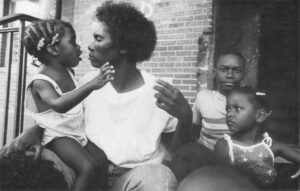Peter Marin
- 1991

Fellowship Title:
- Homelessness and Marginality in America
Fellowship Year:
- 1991

Understanding America’s Poverties and Drowning Mothers
Michael Harrington once wrote that one ought not to talk about “poverty” but about poverties. He meant there are so many ways of being poor that no single description or analysis can apply to them all. The same thing is true of homelessness. There are in actuality a variety of homelessnesses, each one different from the others in terms of causes, particulars and solutions. What I want to do here is describe a particular kind of homelessness, one that has gotten less attention than it deserves: a sporadic and recurrent homelessness so much a part of the cycle of poverty in which some people find themselves that it becomes a predictable and “normal” part of their lives. Connie Taylor and three of her eight children. They live in a housing project owned by the city of New Orleans, Louisiana. Ordinarily we think of homelessness in other ways: as either the result of a long downward slide (as with alcoholics, for example), or else as the result of a cataclysmic event-catastrophic illness, mental collapse, the sudden

Abandoning Men: Jill Gets Welfare–Jack Becomes Homeless
For the past several years, advocates for the homeless have sought public support by drawing attention to the number of homeless families on the streets. That is an understandable tactic, for Americans respond to social issues on the basis of sympathy for the “innocent” or “deserving”– those whose blamelessness touches the heart and who we deem unable to care for themselves. Families, and women with children, obviously fill this bill. A homeless man lies on a steam grate outside a federal building in Washington, D.C. (Photo by Michael O’Brien.) But the fact remains, beyond propaganda, that the problem of homelessness is essentially a problem of single adult men. Far more men than women, and far more single adults than families, end up homeless. Until we understand how and why that happens, nothing we try to do about homelessness will have much of an impact. Most figures pertaining to the homeless come from limited studies or educated guesses which dissolve, when examined, in one’s hand. The most convincing statistics I know can be found in James
